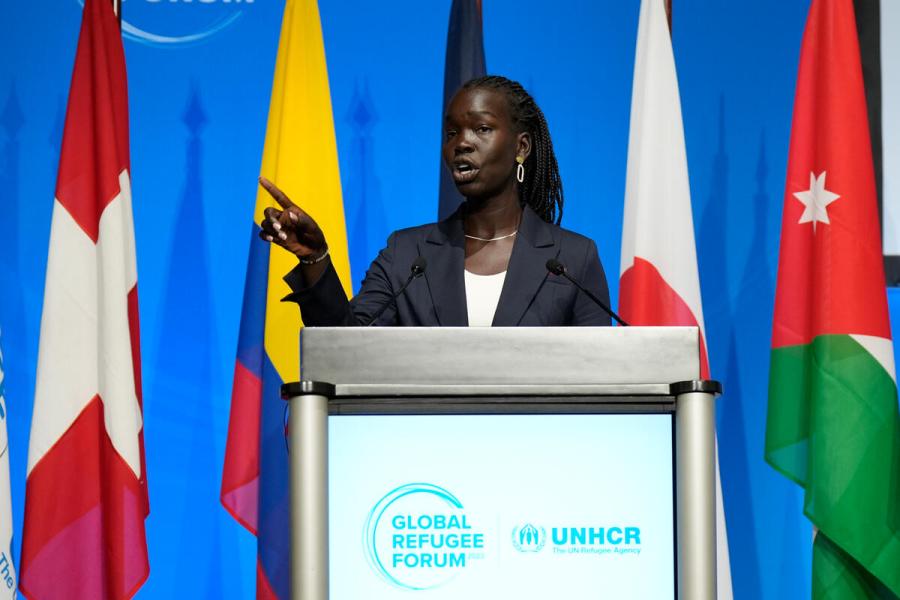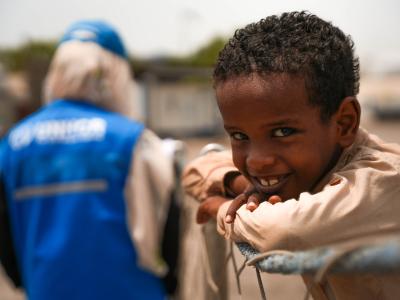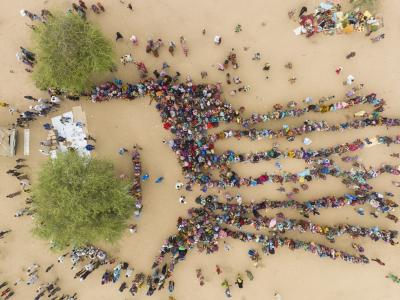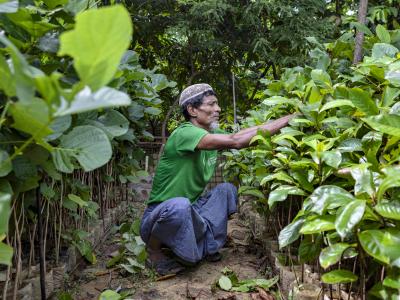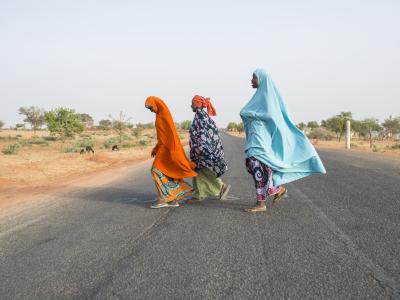Results in 2023
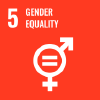
The risk of gender-based violence increases in conflict and displacement, a threat to over 60 million forcibly displaced and stateless women and girls. Conflict-related sexual violence made headlines in several emergencies in 2023 and can result in long-term traumatic impact on survivors. Other forms of gender-based violence (GBV), in particular intimate partner violence and sexual harassment, are prevalent worldwide and disproportionally threaten the safety of forcibly displaced women and girls long after they have fled conflict zones. Despite a decline in total contributions to UNHCR in 2023, many UNHCR operations prioritized life-saving gender-based violence prevention and response programmes, ensuring that survivors were not left behind.
At the 2023 Global Refugee Forum, the gender equality and GBV multi-stakeholder pledges together mobilized 166 pledges, a more than threefold increase in commitments from 50 pledges in 2019. These were the multi-stakeholder pledge on gender equality and protection from GBV, co-led by Australia, Chile, Germany, the United Kingdom, the Action Network on Forced Displacement and women refugee-led organizations (117 pledges), Avec Elles, led by France (35 pledges), and the multi-stakeholder pledge on closing the digital gender gap (14 pledges).
UNHCR is leading inter-agency GBV coordination in 45 refugee and mixed settings, thus enhancing the effectiveness of GBV response. All Refugee Response Plans in 2023 highlighted GBV risks and response alongside dedicated funding needs, a major step to improve funding for GBV programmes.
Data collected by UNHCR country operations in 2023 showed that 72% of countries (88 out of 122 reporting operations) had gender-based violence services available for survivors among forcibly displaced and stateless populations, roughly the same level as in recent years. UNHCR worked with over 200 GBV partners, including over 60 women-led organizations.
UNHCR’s response to gender-based violence included the establishment of safe spaces, where women and girls can access psychosocial support services and be referred to medical and legal support, and – where appropriate – cash assistance. 56% of refugees and asylum-seekers were aware of available gender-based violence services, according to data from 59 country operations. The decline from an estimated 66% in 2022, when the data was collected by 54 operations, demonstrates the need for continuous investment in outreach and innovative information dissemination solutions.
UNHCR provided 1,013 hours of expert technical support to enhance quality and confidentiality of GBV case management services and information management through GBVIMS+ and ProGres, for example in Kenya, South Sudan, Sudan, Ukraine and the United Republic of Tanzania. At least 75% of refugee and asylum-seeking survivors of gender-based violence reported satisfaction with GBV case management services in 35 out of 47 countries where UNHCR operations reported such data. Countries demonstrating notable progress included Bangladesh, Burkina Faso, Cameroon, the Central African Republic, the Democratic Republic of the Congo (DRC), Ecuador, Iraq, Lebanon and the Syrian Arab Republic.
Global partnerships contributed to develop UNHCR workforce’s knowledge on GBV prevention, including on Engaging Men in Accountable Practices (EMAP) and Girl Shine with the International Rescue Committee, and on SASA! Together with Raising Voices. Evidence-based prevention programmes were implemented in 16 operations, contributing to preventing GBV against forcibly displaced women and girls from happening in the first place.
Using the SASA! Together model, almost 2,000 trained community activists reached around 240,000 community members over a four-year period in Bangladesh, Ethiopia, South Sudan and Uganda. Thousands of adolescent girls were empowered through the Girl Shine approach in Ethiopia, Kenya, Syria, the United Republic of Tanzania, Uganda and Zimbabwe. In Syria, 1,029 adolescent girls and their male and female caregivers benefited from the Girl Shine programme, empowering adolescent girls to achieve their full potential. In Iraq, thanks to the EMAP programme, men displayed increased empathy and cooperation with women; they expressed a desire to break old habits and recognized the need to address violence against women and girls.
While levels of acceptance of violence against women remained largely unchanged from 2022, as change takes many years to achieve, UNHCR operations in over two thirds of countries hosting refugees reported that more than 75% of the population did not accept violence against women in 2023. Progress was noted in Chad, the DRC, Ethiopia, Iraq and South Sudan.
Deployment of GBV specialists in 2023 (18 in total) accelerated the establishment of quality prevention and response services for survivors in emergencies in countries such as Chad, the DRC, Ethiopia, Kenya, Moldova, South Sudan and the Syrian Arab Republic. In response to the Sudan emergency, UNHCR GBV prevention and response programming reached 291,285 people, primarily women and girls in Sudan, Chad, South Sudan, Egypt, Ethiopia and Central African Republic. This included psychosocial support primarily through Women and Girls Safe Spaces, health and legal services, and safe accommodation options. In Sudan, 158 community-based protection networks operated across regions including Gedaref, Blue Nile, Wadi Halfa, and East Darfur, providing crucial basic psychological first aid to GBV survivors while playing a central role in awareness-raising within their communities. In Central African Republic, a Ma Mbi Si (“listen to me too” in Sango) centre was established in Korsi refugee camp for newly arrived Sudanese refugee women and girls, offering in-person and remote GBV services. In South Sudan, 22,395 refugee women and girls benefited from dignity kits.
Core indicators

4.1 Proportion of people who know where to access available gender-based violence services

4.2 Proportion of people who do not accept violence against women

4.3 Proportion of Refugee and asylum-seeker survivors who are satisfied with gender-based violence case management services
Spotlight
After seeing the impact of gender-based violence in her native Rwanda and as a refugee in Uganda, Chantal Mukeshimana now works to address the issue in her community with support from a UN-led initiative.
“The training opened the doors for me because I was equipped with the knowledge and the skills to support women"
Challenges to achieving outcomes
Conflict and insecurity exacerbated the risks of gender-based violence and hampered women and girls’ access to GBV prevention and response services. Intersecting forms of characteristics compound risks of GBV, including for women with disabilities or LGBTIQ+ persons.
The impact of reduced humanitarian funding in 2023 meant that the urgent needs of a growing global population of forcibly displaced and stateless people were not fully met. Reductions in life-saving aid contributed to an increase in GBV risks, in particular sexual exploitation, sexual violence, child marriage and intimate partner violence. In Chad, for example, the lack of funding severely hampered humanitarian efforts to respond to the needs of Sudanese refugees. 33% of refugees surveyed said they did not feel safe from gender-based violence, especially when looking for firewood or fetching water.

Working with local women-led organizations (WLOs) to address gender-based violence
In the Democratic Republic of the Congo (DRC), UNHCR worked with three women-led organizations, reaching over 85,412 persons people through their GBV prevention and response programmes, while 699 women at risk of GBV received business start-up grants.
In the Republic of Moldova, 2,800 people, mostly Ukrainian refugee women and girls, received life-saving GBV prevention and response services through a leading Woman-led Organization supported by UNHCR.
In Malaysia, 652 refugee women and girls at risk benefited from community-based psychosocial support services provided by a WLO.
A Chadian WLO was supported to conduct a gender equality assessment in refugee-hosting areas to understand risks for Sudanese refugee women and girls and the capacities of communities, and to develop a multiyear GBV prevention strategy.
In Dadaab refugee camp, Kenya, a refugee women-led organization implemented the Girl Shine model which helped develop a greater sense of agency among refugee adolescent girls while contributing to a reduction in incidents of violence within the community, including child marriage.
Financial overview
Global expenditure and budget for Gender-based violence
$146 million spent against a budget of $339 million
$193 million of unmet needs or 57% of the budget
